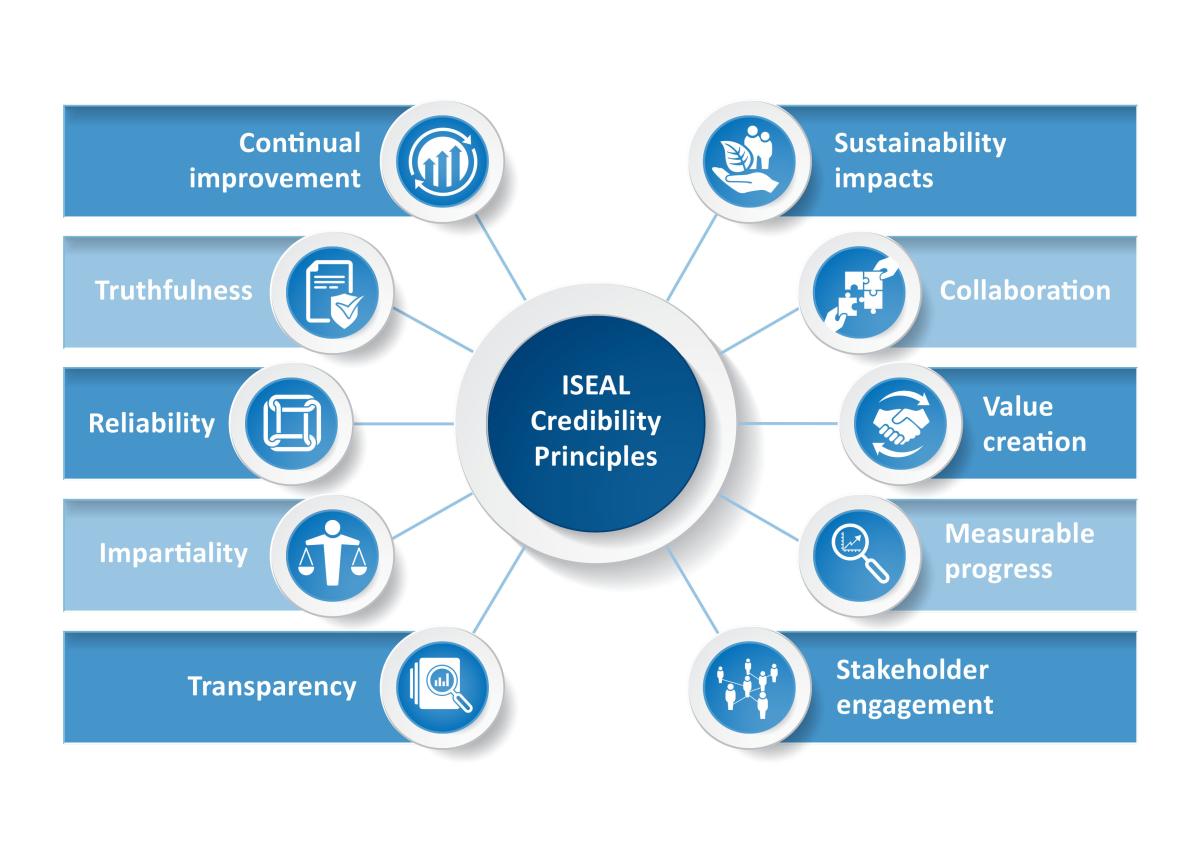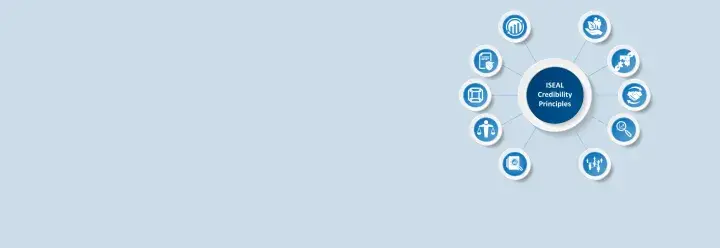Credibility is the key to unlocking crucial sustainability impacts. Embedding trust and confidence, credible sustainability systems help governments and businesses address today’s most urgent challenges.
Patrick Mallet, ISEAL’s Innovations Director, explains what credibility is and why it’s so important.
Credibility is a transformative foundation for solutions tackling the world’s biggest issues, across climate change, biodiversity loss, human rights, living wage and livelihoods.
That’s why credibility is at the heart of ISEAL’s work.
Credibility is critical for impactful sustainability systems
“Credibility is not just a nice to have,” begins Patrick Mallet, ISEAL’s Innovations Director. “It’s what sustainability systems must have to ensure their efforts truly drive sustainability impacts on the ground.
“Credibility underpins everything we do at ISEAL. To help others understand and recognise what credibility looks like in practice, we have the ISEAL Credibility Principles and recently launched ISEAL Code of Good Practice.
“Our Credibility Principles lay the foundations for how sustainability systems and other market-based tools should operate.
“Our Principles define the fundamental values needed to achieve the sustainable impacts they’re aiming for, values like collaboration, reliability, and continual improvement. The ISEAL Code of Good Practice then puts these values into practice.”
ISEAL’s Credibility Principles and the ISEAL Code help sustainability systems build transparency, trust and impact. These credibility tools are beneficial across the landscape of global challenges.
“Through credibility, ISEAL is ensuring sustainability systems recognise and respond to specific issues: human rights, livelihoods, climate, biodiversity – the issues people care most about,” Patrick explains.
Credibility: the sustainable business differentiator
Today, many sustainability labels and claims exist within the market and on products.
It’s confusing and is one reason why governments and policymakers, particularly in the EU, are developing legislation on the green claims and sustainability claims companies make.
It’s important to differentiate meaningful claims, packed with substance and impact, from those which aren’t.
“We strongly support such legislative initiatives. What is important for us is that credibility and credible practices underpin that differentiation,” Patrick elaborates.
“Decades of work tells us that impactful sustainability systems are grounded in credible practices, like transparency for example.
“These systems build consumer confidence by differentiating the meaningful product labels and claims from those that lack substance.
“This, in turn, means businesses using sustainability systems better manage their reputations and social license to operate, supporting decent work and human rights while also protecting natural resources and ecosystem services we all rely on.”
The more that credibility and credible practices become embedded in regulations, the more consumers gain confidence in the choices they make.
Credibility underpins the ‘smart mix’ for strategic partnership
“Governments are actively legislating company performance, through the EU Corporate Sustainability Due Diligence Directive (EU CSDDD), the EU Deforestation Regulation (EUDR) and the Green Claims Directive (GCD), among others,” Patrick says.
We know that credible and effective sustainability systems are incredibly well placed to assist with the implementation of regulatory requirements.
“We talk about a ‘smart mix’ – how best to combine regulatory and voluntary tools,” Patrick says.
“Credibility is a valuable concept that governments can integrate when crafting their regulations.
“Credible sustainability systems offer essential, trustworthy information and assurance that companies need when reporting on their due diligence obligations.
“They also provide reliable data and risk management that companies can use in reporting.
“Therefore, thinking about how sustainability systems and similar tools help implement and support regulations is central to our credibility work,” he concludes.
Futureproofing credibility
“The view of what credibility is evolves over time,” Patrick explains. “Different stakeholders have different priorities and interests. That manifests as a different understanding of ‘what is credible’.”
Crucially, ISEAL tries to capture and understand these changing viewpoints, and what that means for sustainability systems and how they need to respond in a fast-changing world.
“It’s our positioning within the dynamic between these actors and the sustainability systems that really makes our work interesting,” Patrick enthuses.
“One of those big transitions in the last decade has seen companies become more interested in impact information.
“Where sustainability systems were traditionally about putting a logo on a product, they are moving towards a wider range of strategies, such as providing data on specific impacts or incentivising and measuring improvements over time.”
Credible thinking and action should progress to meet evolving challenges.
Such evolutionary thinking informs our Credibility Principles and Code of Good Practice. This ensures their ongoing significance for governments, sustainability systems and businesses.
Credibility, collaboration and scalable impact
Credible sustainability systems are proven to create meaningful impact at scale.
“Our goal should be to expand and improve impacts over time,” Patrick says. “When we think about credibility, it's about building on what we know are good core practices.
“It’s also about learning what works in different places – who needs to be at the table, and what credibility looks like in a specific context to deliver lasting impact.”
Patrick believes more and more companies recognise their responsibility – not just to the people and enterprises within their supply chains, but to the regions and communities from which they source.
“When companies come together with communities, local NGOs and governments, they can address some of these complex sustainability challenges at a scale that is meaningful.
“Sustainability systems can help to facilitate these collaborations,” Patrick concludes.
Using credible sustainability systems, companies and governments together can raise the bar on ambitions, striving for better real-world impact from supply chain to consumer.




